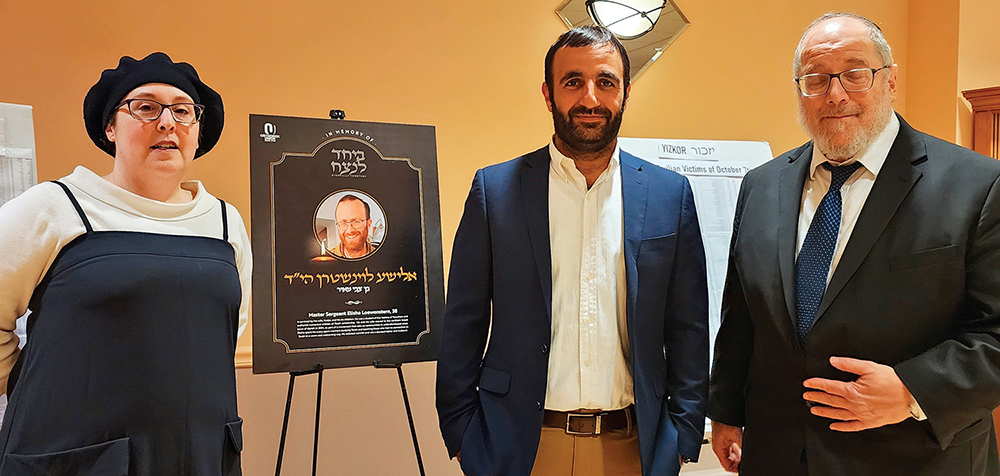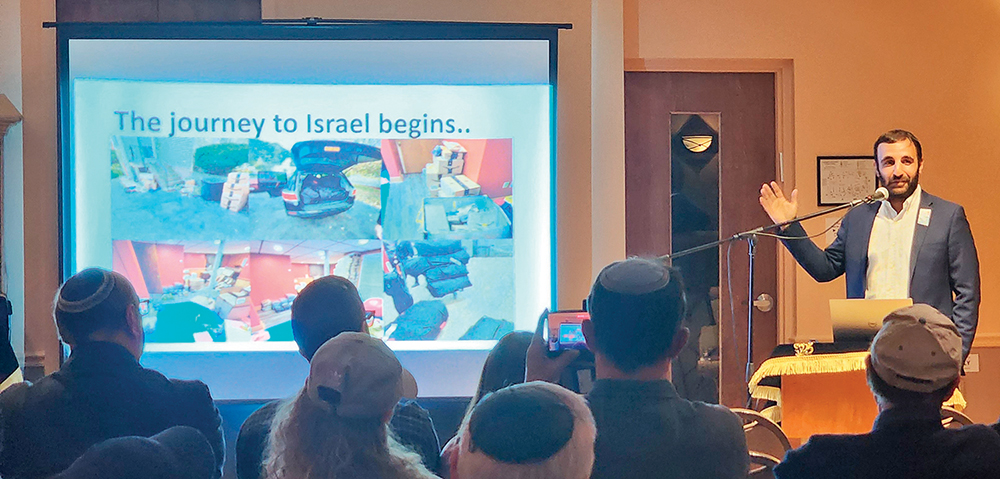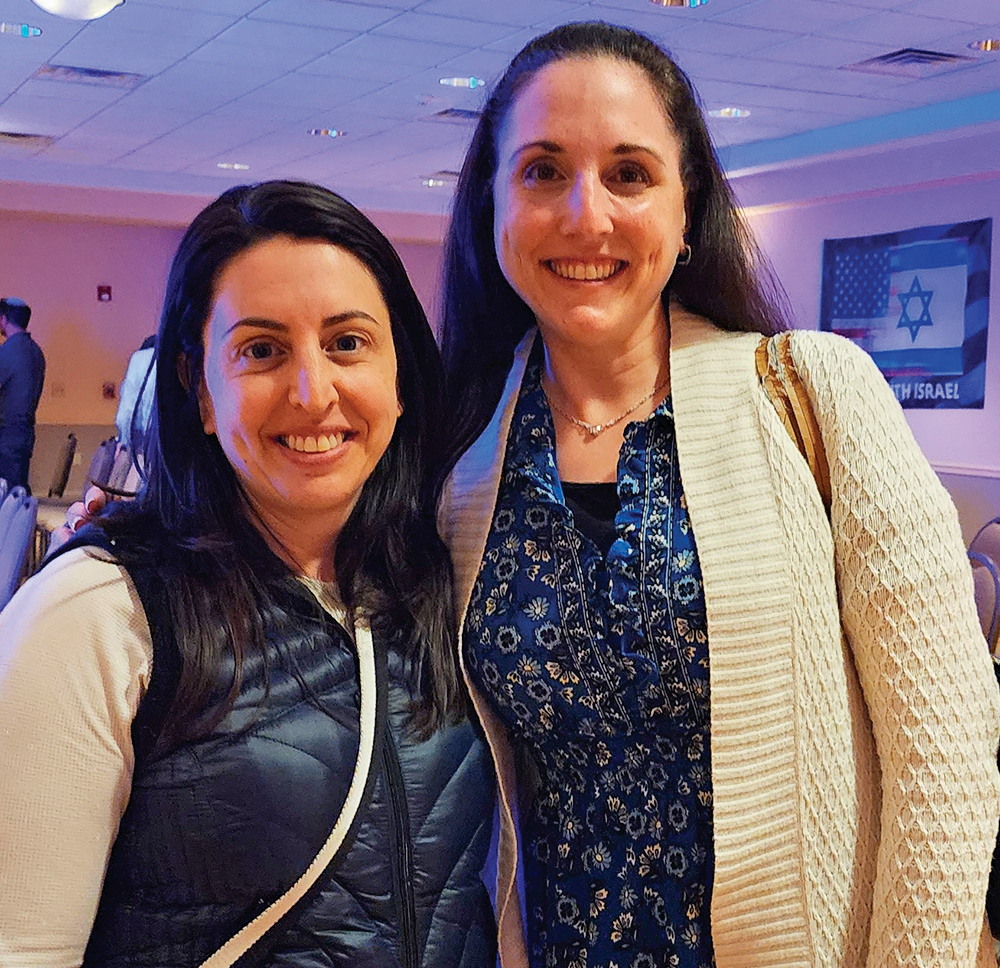
Congregation Ohav Emeth in Highland Park held a meaningful commemoration on Yom HaZikaron on Sunday evening, May 12. Featured speaker Rabbi Ariel Cohen spoke about his experiences as a commander and sniper in an elite unit in the Israeli army at the event that was co-sponsored by East Brunswick’s Yeshivat Netivot Montessori School, Congregation Ohav Emeth and the Orthodox Union’s Jewish Learning Initiative on Campus (JLIC).
Over 100 people attended the program, which began with a siyum of Seder Zeraim which was learned in memory of Elisha Loewenstern, an IDF soldier who was killed in Gaza on December 13 by an anti-tank missile. Ohav Emeth adopted Loewenstern, HY”D, 38 years-old from Harish, who had made aliyah from Highland Park with his family when he was 8 years old. His father, Rabbi Heshey, had been OE’s youth director prior to making aliyah. Rabbi Eliyahu Kaufman noted that even though all fallen IDF soldiers are remembered on Yom HaZikaron, “The focus was on a young boy who was remembered from his time at Ohav Emeth. Although exempt from service, Loewenstern volunteered as he made his life a dedication to helping others.”
Rivky Ross, Netivot head of school, coordinated the program and set the wheels in motion. “Each year we have someone with first-hand experience about Israel speak on Yom HaZikaron to the students at Netivot. It made sense to have Rabbi Cohen also speak to the adults of the community at the same time.”
Rabbi Ariel Cohen was born and raised in Jerusalem where he studied in the Hesder Yeshiva in Eli and served in the IDF as a commander and sniper in an elite unit. Along with his wife, Dorit, he is currently the JLIC director at Brandeis University, serving 150 Orthodox students. He served in Gaza for four months earlier this year, leaving his wife and three children to continue their work on campus. Rabbi Cohen shared his experiences in Gaza after an introduction about the geography and history of the area.

He began by saying that much of Israel has been experiencing a never-ending Yom HaZikaron since October 7. Sadly, there are shiva houses all over the nation and many seriously physically and emotionally injured people. Cohen said he would strive to make his presentation meaningful, but not so heavy that it would be uncomfortable. He admitted that after being in Boston about a year, he has two crazy jobs: Campus rabbi and soldier. “At this point, who can say which job is crazier or more dangerous?”
Before October 7, said Rabbi Cohen, there was a technologically advanced fence on which Israeli communities all along the border relied heavily. The fence was quickly destroyed after being rammed by a bulldozer and the sense of security destroyed in one fell swoop. Israel is still trying to come to grips with what happened.
“We still may never fully understand, but it is guaranteed that it will never be forgotten.” Hamas invaders left behind debris in the houses they infiltrated that included detailed maps indicating that they planned to enter much further into Israel and were not expecting to be stopped so close to the Gaza envelope. College administrators brought periodic briefings to the shul on that Yom Kippur day, and Rabbi Cohen made the decision to return to fight with his unit when his wife urged him to “go where he felt he would be needed the most.”
When he alerted his unit of his plans to return, they sent him wish lists of items that were badly needed at the front. “They didn’t say they would be happy to have me back with the team. The text messages were filled with ‘We need stuff!’ and lists of materials needed. Within 24 hours, parents of students bought the items on Amazon and shipped the items to the Cohens until their basement looked like a storage warehouse with “boxes stacked to the ceiling.”
Rabbi Cohen presented a moving tribute to his Commanding Officer who was the highest-ranking officer there in the area. Colonel Asaf Hamami, HY”D was killed on October 7 while fighting the Gazan invaders after realizing the situation was a full-fledged war and beyond any skirmishes that had happened in the past. When Rabbi Cohen was preparing to enter Gaza, his wife messaged him that there had been no minyan at the college since he left. Deciding to provide some strength and “chizuk” to the students, he taped a message saying that while the army is doing what needs to be done in Israel, those outside should do their job and pray. He is gratified by the results generated when the video went viral. People as far away as Brazil and London are posting what they are doing and how they are committing to more prayer.
Cohen noted that the roads in Gaza that are to allow safe passage of civilians are also full of terrorists. Identity spot checks show that nearly all people there are engaged in or affiliated with some sort of terrorist group. The “innocent civilians” are really anything but. The residential and city buildings are also full of tunnels, with nearly every house containing weapons, uniforms and maps of Israel with notations on how to take over the country.
The formal part of the presentation concluded with descriptions of acts of chesed that were done on behalf of soldiers: A man building a roof covering at no charge for the open Jeep to protect the occupants; a woman offering full use of her home and all her possessions while she herself has been evacuated from the area; people coming from all over to cook meals and make the soldiers more comfortable. Rabbi Cohen also told of the miraculous recovery of one of his squad mates who had been shot in the neck by a sniper. Unbelievably, the shell missed all major arteries until it hit the esophagus—at which point the bullet was swallowed. Surgery to remove the bullet was avoided, but the soldier had to wait a day or two for the bullet to be expelled on its own.

Sara Heaney came from West Long Branch to hear Rabbi Cohen. “I’m the parent of two Brandeis students for whom Rabbi Cohen is a mentor and inspiration. The 40-minute trip is minimal and I wanted to show my support.” Present Highland Park resident Dovid Davies took a break from packing for his aliyah in two weeks. Having lived in Israel for 17 years, he wanted to spend Yom HaZikaron in a meaningful way. Jeremy and Tova Renna of Highland Park came to reconnect with Rabbi Cohen who had spent time with them on an earlier visit to the area and they in turn had visited while in Israel. The reasons for attending the event may have been different for each attendee, but all appreciated the well-presented material and the behind the scenes look as a campus rabbi shared his experiences in Gaza.









